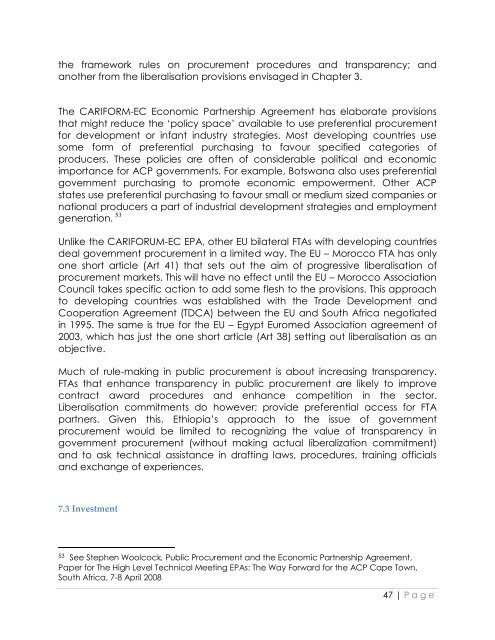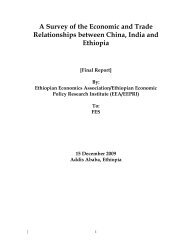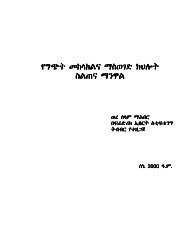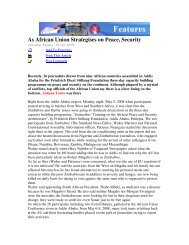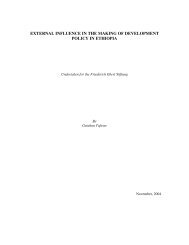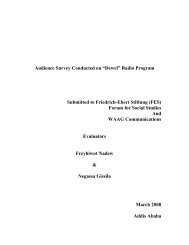Ethiopia and EPA Negotiation 2008 - FES Ethiopia
Ethiopia and EPA Negotiation 2008 - FES Ethiopia
Ethiopia and EPA Negotiation 2008 - FES Ethiopia
You also want an ePaper? Increase the reach of your titles
YUMPU automatically turns print PDFs into web optimized ePapers that Google loves.
the framework rules on procurement procedures <strong>and</strong> transparency; <strong>and</strong><br />
another from the liberalisation provisions envisaged in Chapter 3.<br />
The CARIFORM-EC Economic Partnership Agreement has elaborate provisions<br />
that might reduce the ‘policy space’ available to use preferential procurement<br />
for development or infant industry strategies. Most developing countries use<br />
some form of preferential purchasing to favour specified categories of<br />
producers. These policies are often of considerable political <strong>and</strong> economic<br />
importance for ACP governments. For example, Botswana also uses preferential<br />
government purchasing to promote economic empowerment. Other ACP<br />
states use preferential purchasing to favour small or medium sized companies or<br />
national producers a part of industrial development strategies <strong>and</strong> employment<br />
generation. 53<br />
Unlike the CARIFORUM-EC <strong>EPA</strong>, other EU bilateral FTAs with developing countries<br />
deal government procurement in a limited way. The EU – Morocco FTA has only<br />
one short article (Art 41) that sets out the aim of progressive liberalisation of<br />
procurement markets. This will have no effect until the EU – Morocco Association<br />
Council takes specific action to add some flesh to the provisions. This approach<br />
to developing countries was established with the Trade Development <strong>and</strong><br />
Cooperation Agreement (TDCA) between the EU <strong>and</strong> South Africa negotiated<br />
in 1995. The same is true for the EU – Egypt Euromed Association agreement of<br />
2003, which has just the one short article (Art 38) setting out liberalisation as an<br />
objective.<br />
Much of rule-making in public procurement is about increasing transparency.<br />
FTAs that enhance transparency in public procurement are likely to improve<br />
contract award procedures <strong>and</strong> enhance competition in the sector.<br />
Liberalisation commitments do however; provide preferential access for FTA<br />
partners. Given this, <strong>Ethiopia</strong>’s approach to the issue of government<br />
procurement would be limited to recognizing the value of transparency in<br />
government procurement (without making actual liberalization commitment)<br />
<strong>and</strong> to ask technical assistance in drafting laws, procedures, training officials<br />
<strong>and</strong> exchange of experiences.<br />
7.3 Investment<br />
53<br />
See Stephen Woolcock, Public Procurement <strong>and</strong> the Economic Partnership Agreement,<br />
Paper for The High Level Technical Meeting <strong>EPA</strong>s: The Way Forward for the ACP Cape Town,<br />
South Africa, 7-8 April <strong>2008</strong><br />
47 | P a g e


